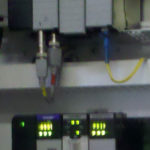
Over the years I’ve received many request for information about ControlLogix redundancy. During that time I’ve developed the following ten tips for new redundancy users:
- At a minimum you will need two processors, two communication modules, two redundancy modules, a redundancy module interconnect cable, two chassis, two power supplies, and at least one rack of whatever distributed I/O platform you plan to use (1756, 1794, etc.)
- The primary and secondary chassis detailed above should be identical, and should not contain any I/O modules.
 The features and hardware supported is highly dependent on the version of RSLogix / Studio 5000 and redundancy firmware you choose.
The features and hardware supported is highly dependent on the version of RSLogix / Studio 5000 and redundancy firmware you choose.- Not all versions of RSLogix / Studio 5000 support redundancy. Therefore, be sure to choose one which does support it BEFORE you begin writing your redundancy program.
- Not all processor firmware versions support redundancy. Versions which do end in “.5” or higher (i.e. firmware version 20.54 does support redundancy.)
- In some cases, redundancy and network module firmware will need to be flashed to a particular revision in order to be compatible with the version of redundancy you have chosen to implement.
- When sizing a processor for a redundancy system, the rule of thumb is you need double the processor memory for a redundant system versus a non-redundant system.
- When setting up the primary and secondary network modules, be sure to set both modules to the same network address (the redundancy module adds “1” to the secondary’s network address automatically.)
- To enable redundancy in your RSLogix 5000 program, check the “Redundancy” checkbox in “Controller Properties.”
And my final and most important tip is to first read the below ControlLogix redundancy manual:
And then to read the release notes for the version of redundancy you plan on implementing (below is a link to the latest version, v20.5.)
I hope the above tips about using Rockwell’s ControlLogix redundancy, and the links to the product manuals is helpful. If you have any comments, questions, or corrections please leave them with us by using the “post a comment or question” link below.
Until next time, Peace ✌️
If you enjoyed this content, please give it a Like, and consider Sharing a link to it as that is the best way for us to grow our audience, which in turn allows us to produce more content 🙂
Shawn M Tierney
Technology Enthusiast & Content Creator
Support our work and gain access to hundreds members only articles and videos by becoming a member at The Automation Blog or on YouTube. You’ll also find all of my affordable PLC, HMI, and SCADA courses at TheAutomationSchool.com.
- FactoryTalk Design Workbench First Look, CCW Comparison - December 19, 2025
- Drew Allen of Grace Technologies on Automation, Safety, and More (P256) - December 17, 2025
- Robotics in Warehouse Automation with Erik Nieves of Plus One Robotics (P255) - December 10, 2025

Discover more from The Automation Blog
Subscribe to get the latest posts sent to your email.




We noticed that Studio 5000 / Logix Designer V24 is incompatible with the redundancy enabled V20.5x firmware.
Unfortunately a lot of our application is already written with V24 features in mind. Notably the new program parameters with “connection” support.
I’ve read elsewhere that firmware V24.5 is required to make use of the new logix designer features in combination with a redundant chassis.
Rockwell says V24.5 can be expected ‘early 2016’ (but that might not be guaranteed).
Good morning edw,
You are absolutely correct – while the “redundancy” checkbox can be found in all recent versions of RSLogix and Studio 5000, it will only work when matching x.5 or x.6 firmware exists.
So those using 21, 23, 24, 26, 27 today have no matching redundancy firmware, and therefore will need to create programs in v20 if they wish to use 1756 redundancy.
PS – I have also heard v24 redundancy firmware is due out by April 1st, but until it passes long term testing without any issues it won’t be released. Also, like most of Rockwell’s redundancy releases, it’s not likely that every new feature in v24 will be supported in the v24.5 redundancy firmware,
Sincerely,
Shawn Tierney
[sc name="stsigcom"]